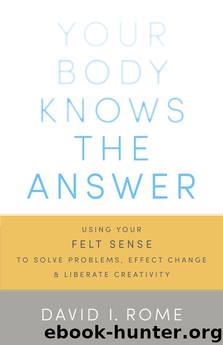Your Body Knows the Answer by David I. Rome

Author:David I. Rome
Language: eng
Format: epub
Publisher: Shambhala Publications
Chapter 10
Mindfulness, Awareness, and the Sovereign Self
THE “MINDFUL” PART of Mindful Focusing derives from the Buddhist meditation tradition. The first exercise in this book—Grounded Aware Presence, or GAP—has its roots in my own years of practice and study with the Tibetan teacher Chögyam Trungpa Rinpoche. In this chapter, we will explore some of the principles behind grounded aware presence.
Mindfulness
Following in the footsteps of Eastern mind-body practices like judo, karate, and hatha yoga that became popular in the West during the twentieth century, Asian-derived techniques for developing mindfulness are now becoming known and practiced globally as we enter the twenty-first century. In part this phenomenon is driven by extraordinary developments in the field of cognitive neuroscience. With the advent of functional magnetic resonance imaging (fMRI) and other new technologies for exploring the brain in real time, scientific evidence for the efficacy of these practices is accumulating rapidly. The Mindful Brain and Mindsight by Daniel Siegel, M.D., are two excellent examples of recent books describing and interpreting the newly emerging understanding of how the brain and nervous system function and the ways in which mindfulness-awareness practices can enhance their functioning.
In colloquial usage, mindfulness means paying attention, staying focused on a task, not getting distracted. In the context of meditation, or mindfulness practice, it denotes a particular quality of moment-to-moment attention. Jon Kabat-Zinn, the leading proponent of mindfulness in health care, defines it as “paying attention in a particular way: on purpose, in the present moment, and nonjudgmentally.” 1
Mindfulness practice involves periods of sitting still and training one’s mind to stay on a particular object, typically one’s own breathing. When thoughts, sensations, memories, emotions, and so forth arise in the mind, as they inevitably will, the practice is simply to make note of them without judgment and return one’s attention to the breath. As the practitioner does this over a period of days, weeks, and more, the mind’s natural tendency to become engrossed in a particular subject, or to jump impulsively from one object of attention to another, gradually subsides. The mind becomes unusually calm, at first intermittently but with regular practice in a more sustained way. At the same time, it becomes clearer, like muddy water that settles when left undisturbed. Mental contents are perceived more accurately, and concentration improves.
An important component of mindfulness is body awareness, really noticing the different parts, movements, and textures of our physical bodies and experiencing them from the inside. The first step in GAP, grounded, refers to the body’s earthiness, its substance and weight, and its felt connection to the external world as it rests on the earth anchored and supported by the force of gravity. Being grounded is the experiential foundation for feelings of stability, balance, ease, and uprightness.
Awareness
The kind of mindfulness that is cultivated in Buddhist meditation is frequently referred to as mindfulness-awareness or mindful awareness. Whereas the word mindfulness suggests the element of effort involved in deliberately placing and sustaining attention on a chosen object, awareness has more to do with the quality of consciousness itself.
Download
This site does not store any files on its server. We only index and link to content provided by other sites. Please contact the content providers to delete copyright contents if any and email us, we'll remove relevant links or contents immediately.
Rewire Your Anxious Brain by Catherine M. Pittman(18628)
Talking to Strangers by Malcolm Gladwell(13336)
The Art of Thinking Clearly by Rolf Dobelli(10400)
Mindhunter: Inside the FBI's Elite Serial Crime Unit by John E. Douglas & Mark Olshaker(9305)
Becoming Supernatural by Dr. Joe Dispenza(8191)
Change Your Questions, Change Your Life by Marilee Adams(7725)
Nudge - Improving Decisions about Health, Wealth, and Happiness by Thaler Sunstein(7684)
The Road Less Traveled by M. Scott Peck(7579)
The Lost Art of Listening by Michael P. Nichols(7485)
Mastermind: How to Think Like Sherlock Holmes by Maria Konnikova(7309)
Enlightenment Now: The Case for Reason, Science, Humanism, and Progress by Steven Pinker(7300)
Win Bigly by Scott Adams(7178)
The Way of Zen by Alan W. Watts(6586)
Daring Greatly by Brene Brown(6494)
Big Magic: Creative Living Beyond Fear by Elizabeth Gilbert(5731)
Grit by Angela Duckworth(5588)
Ego Is the Enemy by Ryan Holiday(5400)
Men In Love by Nancy Friday(5223)
The Laws of Human Nature by Robert Greene(5145)
